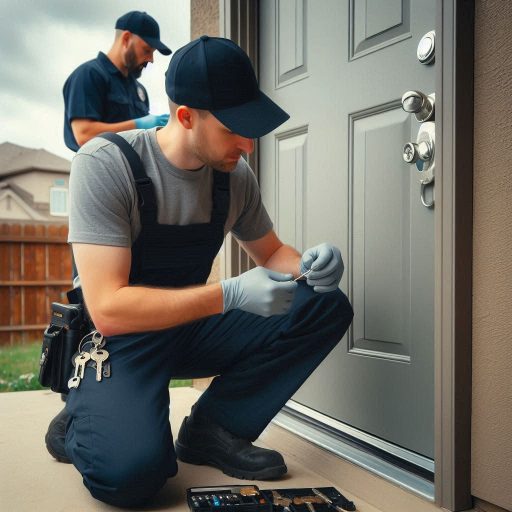Introduction
Locksmith licensing is vital for ensuring safety and security in the industry.
It establishes a standard of professionalism and expertise.
Licensed locksmiths have undergone necessary training and background checks.
This process builds trust between locksmiths and their clients.
Understanding the licensing process is crucial for aspiring locksmiths.
It helps them navigate the requirements and steps involved.
A clear grasp of licensing ensures they meet state regulations.
This knowledge can prevent potential legal issues in their careers.
Additionally, being aware of the licensing process enhances career opportunities.
Licensed locksmiths can access more job openings and command higher rates.
Customers prefer hiring licensed professionals for peace of mind.
They feel secure knowing that their locksmith has met industry standards.
Aspiring locksmiths must prioritize their licensing journey.
Knowledge of the process will empower them to make informed decisions.
It sets a solid foundation for a successful career in locksmithing.
By pursuing proper licensing, aspiring locksmiths can build credibility and gain respect.
They can establish a strong reputation within their community.
Ultimately, understanding locksmith licensing is essential for long-term success in this field.
What is Locksmith Licensing?
Locksmith licensing refers to the regulatory process that allows individuals to legally operate as locksmiths.
This process varies by state and region.
It ensures that locksmiths possess the necessary skills and knowledge to perform their duties safely and effectively.
Licensing helps protect the public from unqualified individuals posing as locksmiths.
Definition of Locksmith Licensing
Locksmith licensing requires individuals to obtain official permission from local or state authorities.
This permission often involves passing examinations, completing training programs, and undergoing background checks.
These requirements help verify that the locksmith has the expertise to handle various lock-related tasks.
Different Types of Licenses Required for Locksmiths
Locksmiths may require different types of licenses based on their services and location.
A general locksmith license allows individuals to perform standard locksmith tasks.
Some states mandate specialized licenses for electronic locking systems or safe cracking.
Additionally, locksmiths may need a business license to operate legally within their community.
Licensing may also vary based on the locksmith’s area of expertise.
For example, residential locksmiths, commercial locksmiths, and automotive locksmiths may face different licensing requirements.
Certifications from recognized professional organizations enhance a locksmith‘s credibility but may not be mandatory.
Importance of Being Licensed as a Locksmith
Being licensed as a locksmith carries significant importance for both professionals and customers.
First, it establishes trust between locksmiths and clients.
Customers prefer hiring licensed locksmiths because they demonstrate professionalism and ethical standards.
Second, licensing ensures locksmiths are knowledgeable about industry practices and technology.
A licensed locksmith is familiar with the latest advancements in security systems and lock technologies.
This expertise enables them to provide effective and efficient services.
Third, licensed locksmiths typically carry insurance, protecting both themselves and their clients.
Insurance can cover potential damages or liabilities during a job.
Customers feel more secure knowing that they are working with a qualified professional who adheres to industry standards.
Moreover, many insurance providers require locksmiths to be licensed before offering coverage.
This requirement highlights the critical nature of licensing in the locksmith field.
Finally, licensing may also provide locksmiths with access to ongoing education and training opportunities.
These opportunities help them stay updated on new technologies and techniques.
Continuous learning enhances their skills, ensuring they can handle complex lock issues.
Locksmith licensing is essential for maintaining a safe and reliable locksmith industry.
It safeguards customers and promotes professionalism among locksmiths.
Always verify a locksmith’s license before hiring to ensure you receive quality service.
Read: Educational Requirements for Childcare Workers Explained
Requirements for Locksmith Licensing
Obtaining a locksmith license involves meeting specific requirements.
These include educational qualifications, training and experience, and background checks.
Understanding these prerequisites ensures you choose a qualified professional.
Educational Requirements
Many states require locksmiths to complete a high school diploma or equivalent.
A solid educational foundation is essential for understanding the mechanics of locks and security systems.
Some states may require additional coursework in locksmithing or related fields.
Relevant subjects may include electronics, security systems, and mechanics.
Completing such coursework can significantly enhance a locksmith’s understanding of their craft.
Training and Experience Needed
Practical training is crucial for aspiring locksmiths.
Many individuals gain experience through apprenticeships with licensed locksmiths.
Apprenticeships typically last from six months to two years, depending on the state and training program.
During this time, trainees learn various skills, including lock installation, repair, and key duplication.
Hands-on experience is vital in developing the skills necessary for effective locksmithing.
Training programs may also include workshops and seminars covering new technologies and techniques.
Some locksmiths choose to complete certification programs offered by professional organizations.
These certifications can provide a competitive edge in the job market.
Background Checks and Other Prerequisites
Most states require background checks for locksmith license applicants.
These checks ensure that candidates have no criminal history that would pose a risk to customers.
A clean background is essential, as locksmiths often enter clients‘ homes and businesses.
Authorities may deny licenses based on serious criminal convictions, such as theft or violence.
In addition to background checks, some states require applicants to provide references.
These references should come from established professionals in the locksmithing industry.
They can vouch for the applicant’s skills and work ethic.
Applicants must also pay licensing fees, which vary by state.
These fees typically cover the processing of the application and background check.
Ensuring timely payment can help prevent delays in obtaining a license.
Furthermore, continuing education may be required to maintain a locksmith license.
Many states mandate that licensed locksmiths complete ongoing training every few years.
This requirement helps locksmiths stay updated on industry standards and advancements in technology.
It also reinforces the importance of maintaining a high level of expertise.
The requirements for locksmith licensing include educational qualifications, practical training, background checks, and ongoing education.
Understanding these prerequisites is essential for aspiring locksmiths.
Meeting these requirements enhances professionalism and ensures a safe experience for customers.
Always verify a locksmith’s credentials before hiring to ensure they meet all licensing requirements.
Read: How to Balance Work and Personal Life in Childcare
Steps to Obtaining a Locksmith License
Obtaining a locksmith license requires several important steps.
Each step ensures that candidates are well-prepared for a successful career in locksmithing.
This process includes completing the application, meeting examination requirements, and demonstrating skills and knowledge.
Application Process
The first step is to complete the application process.
Applicants must gather necessary documents, such as proof of education and training.
They should include their apprenticeship completion certificate or relevant course transcripts.
Additionally, applicants must provide personal identification, such as a driver‘s license or ID card.
Once all documents are ready, applicants submit their application to the appropriate licensing authority.
Most states have a specific agency responsible for issuing locksmith licenses.
It‘s crucial to review the state‘s requirements before submission to avoid delays.
After submission, applicants must pay a licensing fee.
This fee varies by state and typically covers the processing of the application.
Once the application is processed, candidates will receive information regarding the next steps.
Examination Requirements
Most states require candidates to pass an examination to obtain a locksmith license.
The examination tests knowledge of locksmithing, safety protocols, and local laws.
Candidates should prepare for the exam by studying relevant materials, including textbooks and online resources.
Many organizations and schools offer exam preparation courses.
These courses can provide valuable insights into the test format and content.
Candidates may also find practice tests helpful for assessing their readiness.
The examination often includes both written and practical components.
The written portion evaluates theoretical knowledge, while the practical segment tests hands-on skills.
Successfully passing both parts is essential for licensing.
Evaluation of Skills and Knowledge
After passing the exam, candidates may undergo an evaluation of their skills and knowledge.
This evaluation often occurs during an interview with the licensing authority.
Officials may ask questions about specific locksmithing techniques and industry standards.
Additionally, some states require candidates to demonstrate their skills in a real-world scenario.
This hands-on evaluation assesses their ability to handle various locksmithing tasks.
Candidates must show proficiency in tasks such as lock installation, repair, and key duplication.
Finally, successful candidates receive their locksmith license.
They must keep their skills updated through continuing education and training.
Many states require license renewal every few years, often accompanied by additional training requirements.
The steps to obtaining a locksmith license include completing the application process, passing examination requirements, and evaluating skills and knowledge.
Following these steps ensures candidates are prepared for a successful career as a licensed locksmith.
Always check state-specific regulations to understand the licensing process thoroughly.
Read: Top Certifications for Advancing in Childcare Careers

Differences in Licensing Requirements by State
Licensing requirements for locksmiths vary significantly across the United States.
Each state has unique regulations governing the locksmith profession.
Understanding these differences is crucial for aspiring locksmiths seeking licensure.
Overview of State-Specific Regulations
Some states require locksmiths to hold a specific license, while others do not.
For example, California mandates a locksmith license, while some states only require registration.
Many states necessitate a background check, which assesses criminal history and other factors.
Additionally, some states have educational requirements, including completion of specific training programs.
Moreover, states may impose different fees for license applications and renewals.
These fees can vary widely, making it essential for applicants to budget accordingly.
Many states also have distinct examination processes, with some requiring both written and practical assessments.
Challenges in Meeting Various State Requirements
The variations in requirements can create challenges for aspiring locksmiths.
For instance, an applicant moving from one state to another may need to meet new regulations.
This situation can result in additional training or examinations, leading to delays in obtaining a license.
Additionally, some states have stricter regulations regarding continuing education.
Locksmiths must stay current with industry standards and techniques.
Failure to meet these requirements can result in license suspension or revocation.
Applicants may also face challenges in understanding the specific regulations of each state.
Some individuals may not be aware of all the requirements until they apply for a license.
This lack of awareness can lead to wasted time and resources.
Importance of Researching State Laws Before Pursuing Licensure
Researching state laws is crucial before pursuing locksmith licensure.
Understanding the specific requirements of the state where you plan to work can save time and effort.
Thorough research ensures that applicants know the necessary training, exams, and documentation.
Additionally, prospective locksmiths should consult official state websites for the most accurate information.
These websites provide detailed information on licensing processes, fees, and requirements.
They often include resources to help applicants prepare for exams and navigate the licensing process.
Connecting with local locksmith associations can also provide valuable insights.
These organizations often have information about state regulations and can help guide new locksmiths through the licensing process.
Networking with experienced locksmiths can also provide practical advice and support.
Differences in licensing requirements by state can impact aspiring locksmiths.
Understanding state-specific regulations, overcoming challenges, and conducting thorough research is vital.
This knowledge helps ensure a smoother path to obtaining a locksmith license and a successful career in the field.
Transform Your Career Today
Unlock a personalized career strategy that drives real results. Get tailored advice and a roadmap designed just for you.
Start NowRead: Best Pet Grooming Schools in the United States
Benefits of Being a Licensed Locksmith
Becoming a licensed locksmith offers numerous benefits.
These advantages enhance a locksmith’s career and contribute to business success.
Increased Credibility and Trustworthiness
One significant benefit of being licensed is increased credibility.
Clients prefer hiring licensed locksmiths because they trust their skills and professionalism.
A license demonstrates that a locksmith has met state-mandated training and education requirements.
This assurance instills confidence in customers seeking locksmith services.
Licensed locksmiths often build a strong reputation within their communities.
Word-of-mouth referrals become easier to obtain when clients know a locksmith is licensed.
This credibility leads to repeat business and long-term client relationships.
In a competitive industry, trustworthiness can set a locksmith apart from unlicensed competitors.
Ability to Charge Higher Rates
Licensed locksmiths can charge higher rates than their unlicensed counterparts.
Clients are generally willing to pay more for licensed professionals due to perceived value.
The investment in licensing shows that a locksmith has committed to their craft.
With higher rates come increased profitability.
Licensed locksmiths can enjoy better financial stability as they build their businesses.
This advantage allows locksmiths to invest in additional tools, training, and marketing efforts.
Ultimately, better financial prospects contribute to long-term success.
Access to More Job Opportunities
Licensing opens doors to more job opportunities.
Many employers prefer hiring licensed locksmiths, especially in corporate settings.
Being licensed can make a candidate more appealing to potential employers.
Additionally, some job positions may require a locksmith to be licensed.
Without a license, an individual may miss out on job offers.
Many states also have specific licensing requirements for government contracts or large projects.
Having a license ensures eligibility for these opportunities.
Networking becomes easier with a license as well.
Licensed locksmiths can connect with other professionals in the industry.
This network can lead to job referrals, partnerships, and mentorship opportunities.
Building relationships within the locksmith community is essential for career growth.
A licensed locksmith is more likely to engage in ongoing professional development.
Many states require continuing education to maintain a license.
This education ensures locksmiths stay updated on the latest industry trends and techniques.
As locksmiths enhance their skills, they can provide better services.
Increased knowledge allows them to handle complex issues efficiently.
This expertise leads to higher customer satisfaction and more referrals.
The benefits of being a licensed locksmith are substantial.
Increased credibility and trustworthiness enhance client relationships.
The ability to charge higher rates improves financial stability.
Access to more job opportunities expands career prospects.
Committing to licensing ultimately contributes to a successful and fulfilling career in locksmithing.
Gain More Insights: Future Trends in the Insurance Service Industry
Consequences of Operating Without a License
Operating as an unlicensed locksmith can lead to severe consequences.
These repercussions affect both locksmiths and their customers.
Legal Ramifications of Unlicensed Locksmith Work
One major consequence of being unlicensed is legal trouble.
Many states have strict laws regulating locksmithing.
Working without a license can result in fines or penalties.
In some cases, unlicensed locksmiths may face criminal charges.
Legal issues can also lead to a tarnished reputation.
If caught, unlicensed locksmiths might struggle to find future work.
Clients prefer licensed professionals for legal protection.
Unlicensed locksmiths risk losing potential customers due to their illegal status.
Additionally, states may revoke any existing licenses if a locksmith previously operated without one.
This makes it even harder to pursue a legitimate career in the industry.
The legal risks associated with unlicensed locksmithing can severely impact one‘s professional future.
Risks to Customers When Hiring Unlicensed Locksmiths
Customers face significant risks when hiring unlicensed locksmiths.
Unlicensed professionals may lack the necessary training and skills.
This deficiency can lead to poor workmanship and ineffective solutions.
In emergencies, customers rely on locksmiths to provide quick and reliable services.
Unlicensed locksmiths may not be able to deliver this level of service.
Furthermore, unlicensed locksmiths might use subpar materials and techniques.
This practice can compromise the security of a customer‘s property.
If a lock fails after service, the customer may face additional expenses to correct the issue.
This financial burden can be significant, especially in emergency situations.
Unlicensed locksmiths may also engage in dishonest practices.
They could overcharge clients or attempt to scam them.
Without a license, there is no regulatory oversight to protect customers.
This lack of accountability can lead to negative experiences and financial losses.
Importance of Complying with Licensing Regulations
Complying with licensing regulations benefits both locksmiths and their customers.
Licensed locksmiths have undergone rigorous training and background checks.
This process ensures that they are qualified to handle various lock issues.
Customers can trust licensed locksmiths to provide quality service.
Licensing regulations also protect the industry‘s integrity.
By ensuring that all locksmiths meet specific standards, the profession maintains a level of credibility.
This trust helps clients feel safe when hiring locksmith services.
Additionally, complying with licensing regulations fosters professionalism within the industry.
Licensed locksmiths are more likely to adhere to ethical standards.
This adherence leads to improved customer satisfaction and long-term success.
The consequences of operating without a license are significant.
Legal ramifications, customer risks, and the importance of compliance highlight the need for proper licensing.
Locksmiths should prioritize obtaining and maintaining their licenses.
This commitment protects their careers and ensures the safety and satisfaction of their clients.
Conclusion
Understanding the locksmith licensing process is crucial for success in this field.
Licensing ensures that locksmiths meet industry standards.
It protects customers and enhances the credibility of the profession.
Aspiring locksmiths should recognize the importance of obtaining a license.
A license demonstrates a commitment to professionalism and expertise.
Additionally, being licensed opens doors to more job opportunities.
Employers often prefer licensed professionals for their businesses.
A valid license also allows locksmiths to charge competitive rates.
This can lead to increased earnings and financial stability.
Moreover, licensed locksmiths can build trust with customers.
Clients feel more secure hiring a licensed locksmith.
They know the locksmith has undergone proper training and background checks.
Licensing helps to establish a positive reputation in the community.
It differentiates licensed locksmiths from unlicensed ones, who may pose risks.
In summary, pursuing locksmith licensure is essential for career success.
Aspiring locksmiths should prioritize understanding and completing the licensing process.
This commitment will enhance their skills and increase their credibility.
Ultimately, it will lead to a successful and rewarding career in locksmithing.
[E-Books for Sale]
The Big Book of 500 High-Paying Jobs in America: Unlock Your Earning Potential
$19.99 • 500 High-Paying Jobs • 330 pages
Explore 500 high-paying jobs in America and learn how to boost your career, earn more, and achieve success!
See All 500 High-Paying Jobs of this E-Book
1001 Professions Without a Degree: High-Paying American Jobs You Can Start Now
$19.99 • 1001 Professions Without a Degree • 174 pages
Discover 1001 high-paying jobs without a degree! Unlock career tips, skills, and success strategies for just $19.99!




